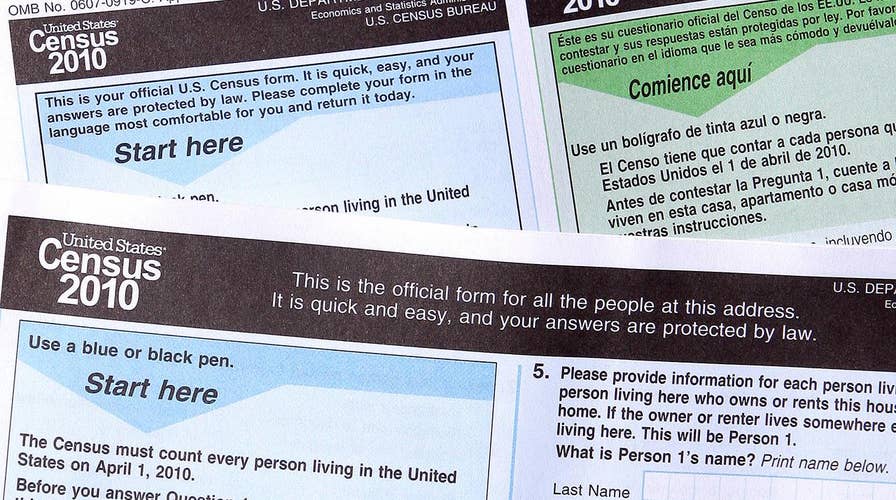White House faces backlash over census citizenship question
Critics say the census citizenship question will lead to lower response rates; John Yoo, former deputy assistant attorney general under George W. Bush, reacts.
Are you a citizen of the United States?
It seems like a simple enough question. But the Trump administration’s plan to add it to the 2020 census has caused a firestorm of protest.
A multi-state lawsuit, led by New York’s Attorney General Eric Schneiderman, is being brought to prevent the question from appearing on the census. California Attorney General Xavier Becerra has filed a separate lawsuit over the same issue.
Opponents claim the citizenship question will keep people from filling out the census, especially those not legally residing in the U.S. As Schneiderman put it in a release, the Trump Administration has made a “reckless decision [that] cuts to the heart of this sacred obligation—and will create an environment of fear and distrust in immigration communities.”
The result of undercounting, Schneiderman adds, would “deprive our states of their fair share of hundreds of billions in federal funds” and “threaten our states’ fair representation in Congress.”
“Even if there is some impact on responses, the value of more complete and accurate data derived from surveying the entire population outweighs such concerns.”
But Commerce Secretary Wilbur Ross, who oversees the census, claims there’s no definitive data on how the citizenship question will affect responsiveness. “However,” he adds, “even if there is some impact on responses, the value of more complete and accurate data derived from surveying the entire population outweighs such concerns.”
While some may fear misuse of the census data, the Census Bureau is required by law to keep information about specific individuals confidential, though data for general populations are available.
The Trump administration further argues that better data will lead to more effective enforcement of the Voting Rights Act—and that minority groups will be better protected against their voting power being diluted.
The Census Clause of the Constitution, in Article 1, Section 2, mandates a census be taken every ten years. As the nation has grown and changed, the information requested on the census form has changed. There were age and gender questions from the start, but along the way, education, marital status, occupation, income and ethnic origin, among other matters, were added.
As for citizenship, the first time it was part of the census was 1820. It became a regular question in the census starting in 1890—though in 1960, there was a question about place of birth, but not direct citizenship status. In 1970, the Census Bureau started sending out short and long-form questionnaires. At that point, the citizenship question was only found on the long form, sent to one out of six households.
For instance, in the 2000 long form, the question was “Is this person a CITIZEN of the United States?” There were five choices. The first four categories were citizens: born in the U.S., born in a territory of the U.S., born abroad to American parents or naturalized. The fifth choice was “No, not a citizen of the United States.”
However, in 2010, there was no long form (it had been replaced by the ongoing American Community Survey, which is sent to approximately 3.5 million addresses a year) and thus no citizenship question in the official census. The Trump administration now plans to bring it back. While the question’s been around a long time, it would be returning to the short form for the first time since 1950.
John Eastman, Henry Salvatori Professor of Law and Community Service at Chapman University, doesn’t think the opposition will prevail. As he told Fox News, their arguments are based on “inference upon inference” to get to what they fear will happen. He adds that perhaps the lower courts, especially those that have ruled against President Trump in previous cases, will find for the plaintiffs, but he “certainly [doesn’t] think the Supreme Court will accept the argument.”
He also notes that no matter how one feels about the inclusion of the question, this is the administration’s call. Even if President Trump’s opponents think the decision was rushed and ill-advised, the system, Eastman says, “delegates authority to the Census Bureau, and ultimately the president, to decide what kind of questions are on there.”
Eastman notes that until 2000, tens of millions of people were asked about their citizenship in the census. In 2010, President Obama’s administration decided the question would not be on the census. Since that was the administration’s decision to make, says Eastman, he “can’t conceive of a rule of law that would allow that one-way rule for one side and not the other.”
Eastman, in fact, would like to go even further than today’s law, where all residents are counted in the census, legal or not. He argued in the 2016 Supreme Court case “Evenwel v. Abbott” that the Census Clause of the Constitution excludes “Indians not taxed” from the census, and today those who are not lawfully present in the United States are in a similar position, “owing allegiance to another sovereign” and therefore should not be part of the electoral process.
While the various parties are going to court over the citizenship question, to many observers, it’s as much a political battle as a legal one. To opponents of the change, it’s a disastrous decision that will guarantee bad data, and a transparent attempt to take away political power from immigrants and blue states. To Trump supporters, asking about citizenship is a common sense question that has a long history and is as relevant as ever, not to mention well within the administration’s power.
What sort of country would it be, they argue, that can’t determine precisely how many citizens it has.









































